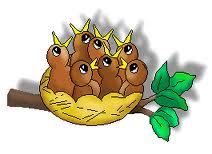Spring is the season for gardening and getting yards back into shape after winter rains. A word of warning: LOOK BEFORE YOU START! Before you begin tree trimming, construction work, yard maintenance, or roofing, take note—
IT IS AGAINST STATE AND/OR FEDERAL LAWS to remove, destroy, or disturb most nesting wild birds and squirrels, their nests, or their eggs and young. These laws apply to homeowners, contractors, and businesses alike and violators may be prosecuted and be assessed stiff fines. Special government permits are required to remove occupied nests and are only justified for a strongly compelling reason, for example, when the location creates a health hazard to humans.
Nesting season is typically March-August. Every year W.E.R.C. and other wildlife rehabilitation facilities across the nation receive orphaned and/or injured baby birds and tree squirrels because they have lost their nests or been injured due to yard and home maintenance. Even trimming trees around the nests can be damaging, because the noise and human activity can scare away the parents and because the nest’s covering may be lost, exposing the babies to predators and hot sun, wind, and rain.
If a nest does accidentally fall down, try to carefully place it in another part of the tree and watch to see if the parent returns to care for the young. If the parent doesn’t come back within 4 hours, contact W.E.R.C. (the Wildlife Education and Rehabiliation Center, we**@*****ca.org, www.werc-ca.org, 779-9372) or your nearest licensed wildlife rehabilitator for advice.
And remember to check the grass or fields before you begin mowing, roto-tilling, or weed-whacking—animals such as rabbits and some birds nest and hide their young in the tall grasses.








